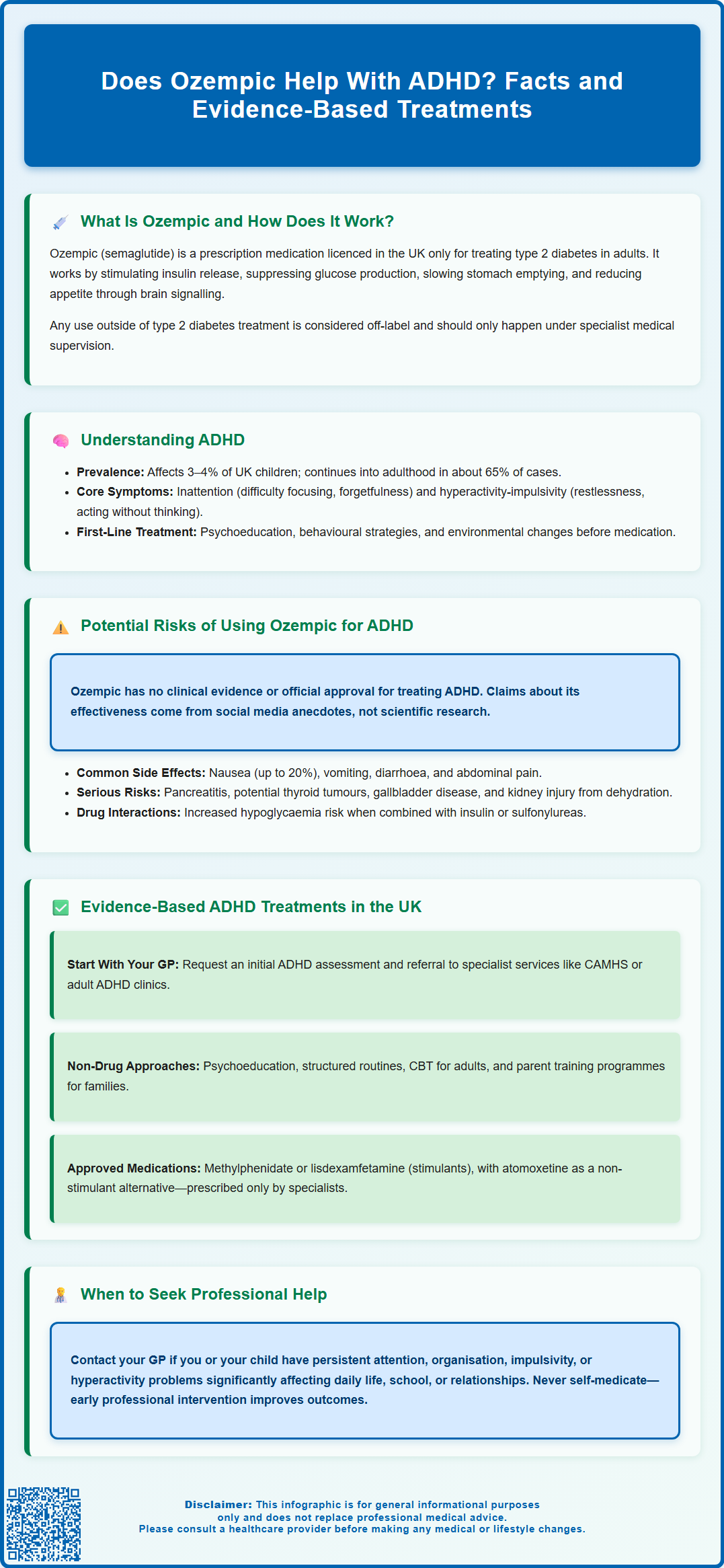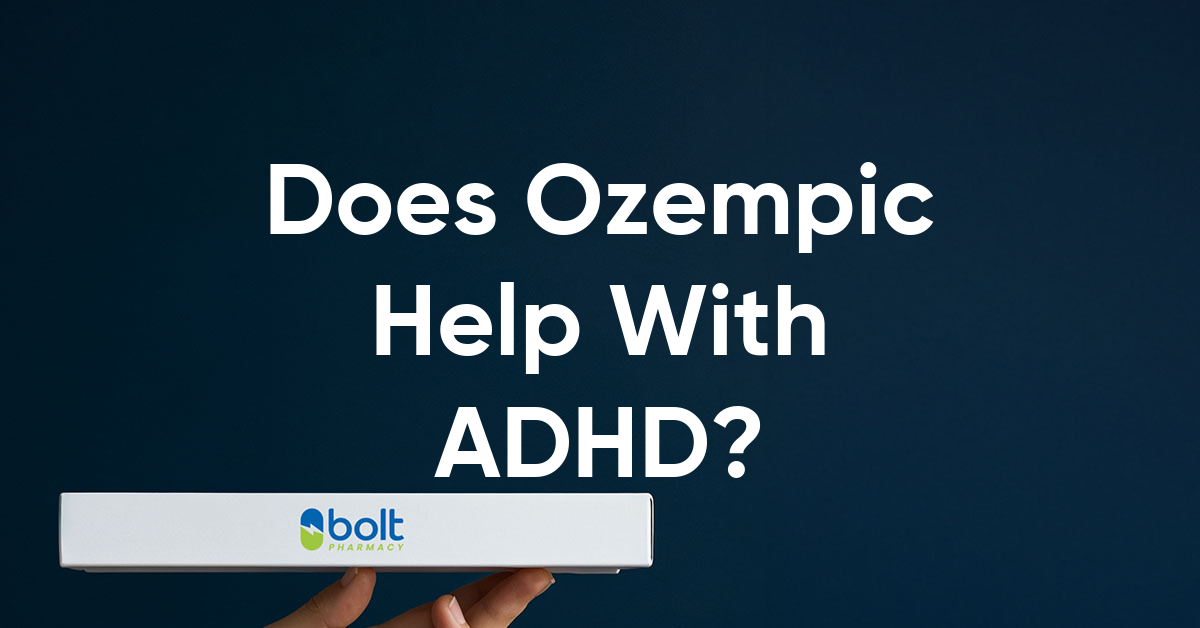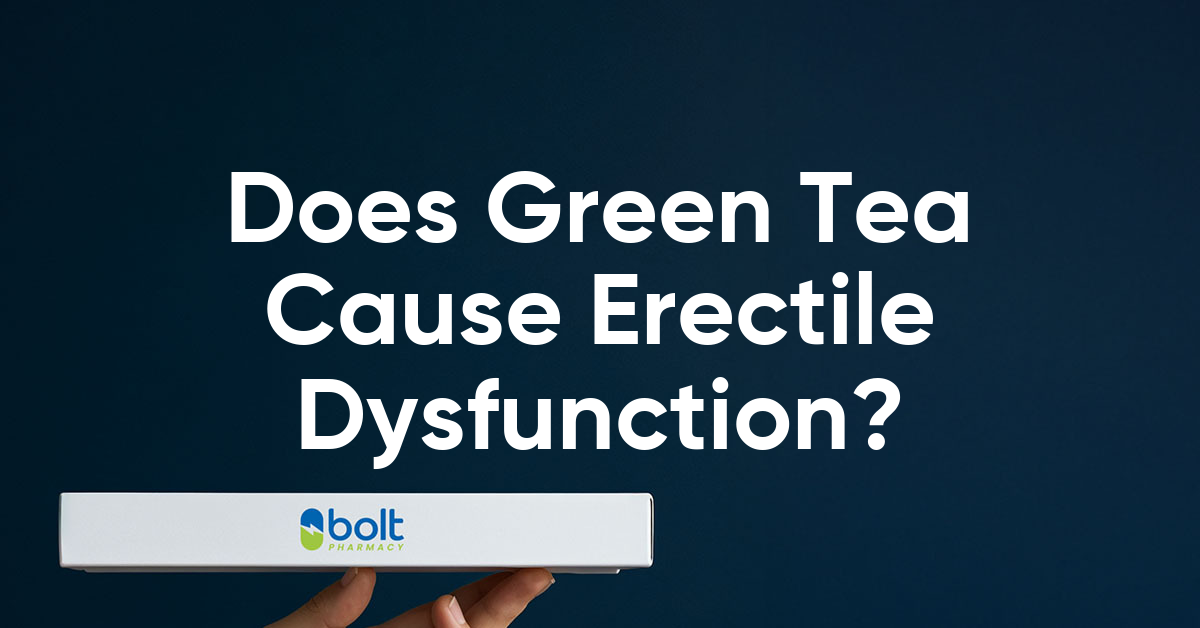There is growing online speculation about whether Ozempic might help with ADHD symptoms, but it's crucial to understand the facts. Ozempic (semaglutide) is a GLP-1 receptor agonist licensed in the UK exclusively for treating type 2 diabetes mellitus in adults. It is not approved by the MHRA for ADHD treatment, and no clinical evidence supports its use for this neurodevelopmental condition. This article examines what Ozempic actually does, explores evidence-based ADHD treatments available through the NHS, and explains why using diabetes medications for unapproved purposes carries significant risks without proven benefits.
Summary: Ozempic is not licensed or approved for ADHD treatment and has no clinical evidence supporting its use for this condition.
- Ozempic (semaglutide) is a GLP-1 receptor agonist licensed exclusively for type 2 diabetes mellitus treatment in the UK.
- The medication works by stimulating insulin secretion, suppressing glucagon release, slowing gastric emptying, and reducing appetite.
- NICE-recommended ADHD treatments include methylphenidate, lisdexamfetamine, atomoxetine, and non-pharmacological interventions like CBT.
- Using Ozempic off-label for ADHD carries risks including gastrointestinal effects, pancreatitis, thyroid concerns, and lacks efficacy data for ADHD symptoms.
- Patients with ADHD concerns should consult their GP for referral to specialist services for evidence-based assessment and treatment.
Table of Contents
What Is Ozempic and How Does It Work?
Ozempic (semaglutide) is a prescription medication licensed in the UK for the treatment of type 2 diabetes mellitus in adults. It belongs to a class of drugs called glucagon-like peptide-1 (GLP-1) receptor agonists, which work by mimicking the action of a naturally occurring hormone that regulates blood glucose levels.
The mechanism of action involves several key processes:
-
Stimulating insulin secretion from pancreatic beta cells in response to elevated blood glucose
-
Suppressing glucagon release, which reduces glucose production by the liver
-
Slowing gastric emptying, which helps control post-meal blood sugar spikes
-
Reducing appetite through effects on brain centres that regulate hunger
Ozempic is administered as a once-weekly subcutaneous injection and is available in pre-filled pens. Treatment typically starts with 0.25 mg once weekly for 4 weeks as an initiation dose, before increasing to 0.5 mg and potentially higher doses for glycaemic control. While Ozempic may cause weight loss as a secondary effect, it is important to note that in the UK, Ozempic is not licensed for weight management. A different semaglutide product called Wegovy is specifically licensed for weight management.
It is important to emphasise that Ozempic is not licensed or approved for the treatment of ADHD by the Medicines and Healthcare products Regulatory Agency (MHRA) or any other regulatory body. The drug's approval is strictly limited to glycaemic control in type 2 diabetes. Any use outside this indication would be considered off-label and should only occur under specialist supervision with appropriate clinical justification.

Understanding ADHD and Current Treatment Options
Attention deficit hyperactivity disorder (ADHD) is a neurodevelopmental condition characterised by persistent patterns of inattention, hyperactivity, and impulsivity that interfere with daily functioning and development. In the UK, ADHD affects approximately 3–4% of children and persists into adulthood in around 65% of cases, though it often remains undiagnosed in adults.
The core symptoms fall into two main categories:
-
Inattention: difficulty sustaining focus, being easily distracted, forgetfulness, poor organisation, and difficulty completing tasks
-
Hyperactivity-impulsivity: restlessness, excessive talking, difficulty waiting turns, interrupting others, and acting without considering consequences
According to NICE guidelines (NG87), the management of ADHD in the UK follows a comprehensive approach that includes both non-pharmacological and pharmacological interventions. Initial management typically involves psychoeducation, environmental modifications, and behavioural strategies. Parent training programmes are recommended as first-line treatment for younger children, while cognitive behavioural therapy (CBT) may be particularly helpful for adults with ADHD.
When medication is indicated, NICE recommends:
-
Methylphenidate (e.g., Ritalin, Concerta XL) or lisdexamfetamine (Elvanse) as first-line pharmacological treatments
-
Atomoxetine (Strattera) – a non-stimulant selective noradrenaline reuptake inhibitor – when stimulants are not suitable or have been ineffective
-
Guanfacine (Intuniv) – a non-stimulant alpha-2 adrenergic agonist licensed for children and young people aged 6-17 years (not licensed for adults in the UK)
These medications have undergone rigorous clinical trials demonstrating efficacy and safety in ADHD populations, with well-established monitoring protocols to manage potential adverse effects.
Potential Risks of Using Ozempic for ADHD
There is no official link or clinical evidence supporting the use of Ozempic for ADHD treatment, and using this medication for such purposes carries significant risks. The suggestion that Ozempic might help with ADHD appears to stem from anecdotal reports on social media rather than scientific research, and patients should be aware of the potential dangers of off-label use.
Key safety concerns include:
-
Gastrointestinal adverse effects: The most common side effects of Ozempic include nausea (occurring in up to 20% of patients), vomiting, diarrhoea, abdominal pain, and constipation. These effects can be particularly pronounced during dose escalation and may significantly impact quality of life.
-
Risk of hypoglycaemia: While the risk of hypoglycaemia with Ozempic monotherapy is low, it increases when combined with insulin or sulfonylureas. Individuals without diabetes using this medication may experience symptoms related to reduced food intake rather than true hypoglycaemia.
-
Thyroid concerns: The UK SmPC notes that GLP-1 receptor agonists have been associated with thyroid C-cell tumours in rodent studies, though the relevance to humans is unknown. Patients should be vigilant for symptoms such as a lump in the neck or persistent hoarseness.
-
Pancreatitis risk: There have been reports of acute pancreatitis in patients taking GLP-1 receptor agonists. Patients should stop taking the medication and seek urgent medical care if severe abdominal pain is experienced.
-
Additional safety concerns: Ozempic may cause complications of diabetic retinopathy (particularly with rapid improvement in blood glucose), gallbladder disease, and dehydration that could lead to acute kidney injury.
-
Lack of efficacy data: Without clinical trials examining Ozempic's effects on ADHD symptoms, there is no evidence it would provide any benefit for core ADHD symptoms such as inattention, impulsivity, or hyperactivity.
Patients should never use Ozempic without a valid prescription for an approved indication, and those with ADHD concerns should consult their GP or a specialist rather than seeking unproven treatments. If you experience any suspected side effects from any medication, report them through the MHRA Yellow Card scheme.
Evidence-Based ADHD Treatments Available in the UK
For individuals concerned about ADHD symptoms, the NHS provides a clear pathway to evidence-based assessment and treatment. The first step is to contact your GP, who can conduct an initial assessment and, if appropriate, refer you to specialist services such as community paediatrics, Child and Adolescent Mental Health Services (CAMHS), or adult ADHD services for comprehensive evaluation.
Diagnostic assessment in the UK follows NICE guidelines and typically involves:
-
Detailed clinical history taking, including developmental history and symptom onset
-
Assessment of symptoms across multiple settings (home, work, school)
-
Evaluation of functional impairment in daily life
-
Screening for co-existing conditions such as anxiety, depression, or learning difficulties
-
Use of validated rating scales and questionnaires
Non-pharmacological interventions form an essential component of ADHD management:
-
Psychoeducation: Understanding ADHD helps patients and families develop effective coping strategies
-
Environmental modifications: Structured routines, organisational tools, and workplace adjustments
-
Cognitive behavioural therapy (CBT): Particularly helpful for adults with ADHD to address negative thought patterns and develop practical skills
-
Parent training programmes: For children and young people, these programmes help families manage challenging behaviours
Pharmacological treatment, when indicated, should be initiated by specialists experienced in ADHD management, with potential shared-care arrangements for ongoing prescribing. Monitoring should include baseline and follow-up measurements of blood pressure, heart rate, weight, and height (in children). Growth should be monitored at least every 6 months in children, and an ECG should be performed if clinically indicated. A cardiovascular history and family history should be recorded at baseline.
When to seek help: Contact your GP if you or your child experience persistent difficulties with attention, organisation, impulsivity, or hyperactivity that significantly impact daily functioning, academic performance, or relationships. Early intervention and appropriate treatment can substantially improve outcomes and quality of life for individuals with ADHD. Never attempt to self-medicate or use medications prescribed for other conditions, as this may be dangerous and delay access to effective, evidence-based care.
Frequently Asked Questions
Is Ozempic approved for treating ADHD in the UK?
No, Ozempic is not approved by the MHRA for ADHD treatment. It is licensed exclusively for type 2 diabetes mellitus in adults, and there is no clinical evidence supporting its use for ADHD symptoms.
What are the recommended first-line medications for ADHD in the UK?
According to NICE guidelines, methylphenidate (such as Ritalin or Concerta XL) and lisdexamfetamine (Elvanse) are recommended as first-line pharmacological treatments for ADHD. Atomoxetine is recommended when stimulants are unsuitable or ineffective.
What should I do if I'm concerned about ADHD symptoms?
Contact your GP for an initial assessment. If appropriate, they can refer you to specialist services such as CAMHS for children or adult ADHD services for comprehensive evaluation and evidence-based treatment following NICE guidelines.
The health-related content published on this site is based on credible scientific sources and is periodically reviewed to ensure accuracy and relevance. Although we aim to reflect the most current medical knowledge, the material is meant for general education and awareness only.
The information on this site is not a substitute for professional medical advice. For any health concerns, please speak with a qualified medical professional. By using this information, you acknowledge responsibility for any decisions made and understand we are not liable for any consequences that may result.
Heading 1
Heading 2
Heading 3
Heading 4
Heading 5
Heading 6
Lorem ipsum dolor sit amet, consectetur adipiscing elit, sed do eiusmod tempor incididunt ut labore et dolore magna aliqua. Ut enim ad minim veniam, quis nostrud exercitation ullamco laboris nisi ut aliquip ex ea commodo consequat. Duis aute irure dolor in reprehenderit in voluptate velit esse cillum dolore eu fugiat nulla pariatur.
Block quote
Ordered list
- Item 1
- Item 2
- Item 3
Unordered list
- Item A
- Item B
- Item C
Bold text
Emphasis
Superscript
Subscript












